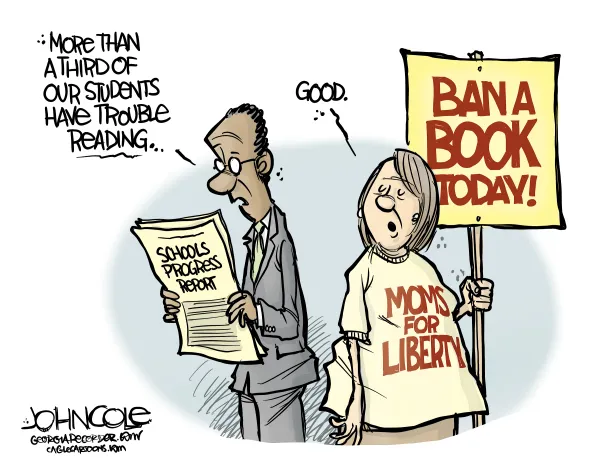
The Need to Expand Education: Fighting Back Against Book Bans & Budget Cuts
November 11, 2024Feature Article(Source)
Although education in the United States is not perceived as a fundamental right protected by the Constitution, as seen in San Antonio Independent School District v. Rodriguez, there is no denying that education is a significant pillar in individuals’ lives and within American society.
Education not only allows for personal growth and access to information, but it allows for more community involvement. Americans with higher levels of education are more likely to vote, volunteer, and donate to charities. Furthermore, education furthers economic growth and financial stability. Americans with college degrees earn 117% more a year than those who do not complete high school. Access to high quality public education is necessary as it is one of the keys to addressing systemic equality and disparities that directly impact marginalized communities. Too many students from Black, Latinx, Native American, and low-income communities have limited access to advanced courses and dual enrollment opportunities, stunting their growth and resources. By expanding public education and pushing for equity in funding and resources, we can further a more just society.
Given the political climate, education has been at the forefront of public policy issues, with public education under attack and limited in many states across the nation. One of the most prominent occurrences has been a series of book bans. While the U.S. is not new to book bans, as they have been taking place since 1637, there has been an uptick in the amount of books banned within recent years revolving around racism, sexuality, gender, and history. Currently, there are nearly 10,000 instances of book bans as of the 2023-2024 school year, nearly tripling the 3,362 bans recorded the previous year. 37% of those books had themes of race and racism and 36% had themes of sexuality. Florida and Texas are the two states with the most bans, however, this crisis has impacted 41 different states and nearly 250 public school districts.
Within the past few years, Florida has banned the most books, with other states following suit utilizing Florida’s tactics. Florida passed the “Don’t say Gay” law and this has been mimicked in Iowa. Furthermore, Books Looks, a website created by Moms for Liberty members from Florida, has been encouraging book censorship and has been used widely all the way to Pennsylvania and Virginia. For the most part, bans in the curriculum, for example with Critical Race Theory, and book bans have stemmed from state legislation, which have made it easier to remove books without due process or any formal process. Utah’s HB29 law requires all schools in the state to ban a book once three school districts have found it objectionable. South Carolina’s regulation 43-170 bans books with sexual subject matter and gives the state Board of Education the ability to censor works statewide. Tennessee’s HB 843 requires schools to remove books with violence or any sexual content. Governor DeSantis of Florida has passed a series of broad regulations in Florida that have allowed for many books to be pulled off shelves. House Bill 1467 allows parents to challenge any materials that are selected and petition for their removal from schools and the “Stop WOKE” Act restricts gender and race based discussions in the classroom.
Book bans have a profound effect on our schools and students. This creates a censorship of ideas and does not allow for students to engage in meaningful conversations about sexuality, race, etc.; these conversations are necessary for developing youth navigating their own identity and other identities around them. Book bans prevent diverse students from reading stories with perspectives that are representative of their own experiences. The Associate Professor of Economics and Education at the Teacher’s College at Columbia University explains that “books can change outcomes for students themselves when they see people who look like them presented.” Book bans diminish the quality of education students receive as they become sheltered from true history and ideas that allow for society to flourish and grow. Book bans prevent children from learning the truth just because it may be uncomfortable or difficult topics of conversation. These conversations are a crucial part of highlighting injustices that have occurred – and are still occurring – so that people take action to fix them.
Another issue has been the decrease in funding for public schools, especially for those in low-income neighborhoods. As early as 2016, the Trump Administration cut $7.1 billion in funding in an attempt to weaken the U.S. Department of Education. While there have been budget cuts on the federal level, there have also been many issues surrounding distribution of money to schools on the local level. Increased spending improves college attendance rates, graduation rates, and test scores. According to a report from 2018, school districts with the most students of color receive about 13% less per student than school districts with a predominantly white student population. Most school funding gaps come from the value of properties in the area and property taxes. However, even when communities with low property values tax themselves higher, they still fail to generate an equal level of resources in comparison with their wealthier counterparts. State and federal programs try to compensate by sending additional funding to low-income schools, but it is still insufficient.
Not to mention, the legacy of Jim Crow and segregation have created funding issues that are still seen today. During Jim Crow, states increased reliance on local taxation. Some went as far as to craft color-coded funding systems, where taxes from white neighborhoods funded schools with white students. States in the north followed suit. For example, Illinois imposed a statewide property tax for white education with supplemental local funding. While Brown v. Board of Education deemed school segregation unconstitutional, the decentralization of school funding remained unchecked to the point where courts accepted them as a “neutral” part of public education.
To combat the increase of book bans, there needs to be more discourse about the negative effects of these bans on students and teachers. There needs to be more support for the student movements and organizations fighting back. In a 2023 NPR poll, 65% of Americans stated that they opposed book bans by school boards and 69% said they opposed book bans by state lawmakers. Yet, this is not reflected in regulation. There needs to be consequences for political officials not adhering to the desires of their constituents. Through advocacy and protesting, people can simultaneously call for revocation of these book banning policies and protection of free expression and education. Furthermore, there has been a lot of discourse over whether book bans impede on First Amendment rights, violating freedom of speech and expression. There is more research to be done here that could potentially lead to outlawing book bans.
As for budget cuts, more representation in government and advocacy for more funding to low-income schools will help shift more funding to the schools. Also, students pushing for more policy can grab the attention of private donors. However, a more permanent fix would be for state governments to decide how funding for schools is divided with increased resources for low-income communities. There needs to be policy changes to increase funding, prioritize resource distribution programs, and shift the focus from just property taxes to a focus on student needs within schools. Furthermore, there needs to be a push for protections for public education overall and acknowledgment of how important public education is across the country. This would help protect the Department of Education and maintain education for all communities, not just the ones who would be able to pay for it.
Allowing limitations in education to persist will ensure a damaging, censored, and inadequate academic career for our students and future leaders. The time to act is now.
Suggested Citation: Marieya Jagroop, The Need to Expand Education: Fighting Back Against Book Bans & Budget Cuts, Cornell J.L. & Pub. Pol’y, The Issue Spotter, (Nov 11. 2024), https://jlpp.org/the-need-to-expand-education-fighting-back-against-book-bans-and-budget-cuts/.

Marieya Jagroop is a second-year law student at Cornell Law School. She graduated from Macaulay Honors at John Jay College of Criminal Justice with a degree in Political Science and Psychology. Aside from her involvement with Cornell Law School’s Journal of Law and Public Policy, she is Vice President of the Latin American Law Students Association and Co-Secretary of the Black Law Students Association.
You may also like
- March 2025
- February 2025
- November 2024
- October 2024
- April 2024
- March 2024
- February 2024
- November 2023
- October 2023
- April 2023
- March 2023
- February 2023
- January 2023
- December 2022
- November 2022
- October 2022
- May 2022
- April 2022
- March 2022
- February 2022
- January 2022
- December 2021
- November 2021
- October 2021
- May 2021
- April 2021
- March 2021
- February 2021
- January 2021
- November 2020
- October 2020
- September 2020
- August 2020
- July 2020
- June 2020
- May 2020
- April 2020
- March 2020
- February 2020
- January 2020
- November 2019
- October 2019
- September 2019
- April 2019
- February 2019
- December 2018
- November 2018
- October 2018
- September 2018
- March 2018
- February 2018
- January 2018
- December 2017
- November 2017
- October 2017
- September 2017
- May 2017
- April 2017
- March 2017
- February 2017
- December 2016
- November 2016
- October 2016
- April 2016
- March 2016
- February 2016
- January 2016
- December 2015
- November 2015
- October 2015
- June 2015
- May 2015
- April 2015
- March 2015
- February 2015
- January 2015
- December 2014
- November 2014
- October 2014
- August 2014
- March 2014
- February 2014
- January 2014
- December 2013
- November 2013
- October 2013
- September 2013
- May 2013
- April 2013
- March 2013
- February 2013
- January 2013
- December 2012
- November 2012
- October 2012
- September 2012
- June 2012
- April 2012
- March 2012
- February 2012
- January 2012
- December 2011
- November 2011
- October 2011
- September 2011
- August 2011
- April 2011
- March 2011
- November 2010
- October 2010
- September 2010